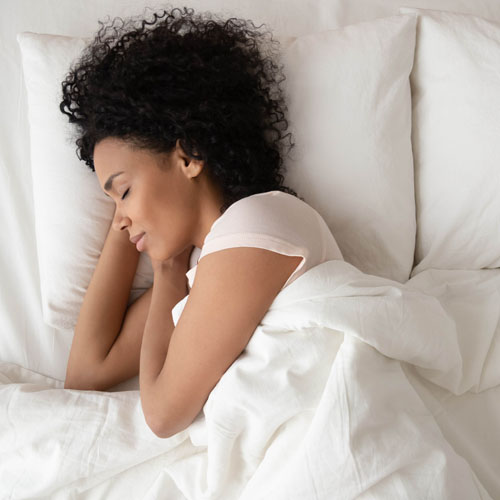The hashtag #Sleep brings in billions of views on TikTok, with creators sharing their struggles and hacks and coining terms such as the “sleepy girl mocktail” that’s made with tart cherry juice and magnesium supplements.1
The vast world of sleep aids, sleep conditions and actionable solutions for quality sleep has reached the forefront of many people’s minds … and it’s only just the beginning. In fact, the sleep aids market is expected to be valued at $99.28 billion by 2028.2
And with so many people concerned about getting a good night’s sleep, it’s becoming more widely recognised that sleep is at the centre of everything we do and serves as a crucial aspect of both mental and physical health.
Yet, despite this increased awareness, data shows that Americans are still not getting enough of it.3
Why quality sleep is crucial to our overall health
I often tell my patients that rest is one of the most essential and powerful things we can do for our bodies. Sleep impacts everything from our mental health, emotional intelligence, immune system and fatigue levels to our blood pressure, heart function, brain development and so much more.4
Sleeping is how we process and defray our hard drive after stimulating ourselves all day. When this is disrupted, our health pays the price.
At the core of quality sleep is melatonin, a hormone produced by our brains in response to darkness that helps with the timing of our circadian rhythms.5 Not only does melatonin impact sleep, but it also has several other therapeutic benefits. It acts as a primary antioxidant and is involved in blood pressure support, autonomic cardiovascular regulation and immune system regulation.
Furthermore, it’s involved with various physiological aspects, including retinal functions, the detoxification of free radicals, bone formation, body mass regulation and more. It even plays a unique role in reproduction and fertility.
Melatonin synthesis is enhanced by darkness and inhibited by light, with its secretion starting after sundown and reaching its peak in the middle of the night.
Unfortunately, this means that screen time right before bed can throw off our melatonin cycle, suppressing it to a level that prevents us from falling and staying asleep.

Additionally, melatonin levels decrease with age, leading to further sleep issues as we get older. With these factors in mind, it’s important to be aware of what could negatively impact our sleep and work towards finding solutions that will ensure a good night’s rest.
The ever-evolving sleep market
When it comes to sleep aids and products, we have historically been focused on melatonin and certain botanicals such as valerian and hops. The most significant development in recent years has been the shift toward cannabidiol (CBD), which came into the market thanks to the farm bill.6
There have been numerous applications of CBD, cannabigerol (CBG), terpenes and essential oils, all of which have transformed the marketplace and become key pillars of the sleep industry.
Additionally, the use of magnesium has grown exponentially in recent years.7 It is the fourth most abundant element in the human body and plays a crucial role in many processes, including regulating muscle and nerve function, blood sugar levels, blood pressure and more.
It's a cofactor for more than 600 enzymes and an activator for an additional 200. It helps to regulate neurotransmitters that are directly related to sleep and enhances stress reduction, optimal sleep-wake cycles and relaxation — possibly explaining why a large reason why consumers are starting to reach for it more.8,9
Deterrents to quality sleep
Today, more people are looking for more holistic, health-conscious solutions than previous generations.
For example, sleep quality is compromised when alcohol, drugs and sedatives such as Ambien come into play; they may increase quantity and make falling asleep easier, but they don't provide the same rejuvenation as natural cyclical sleep.
Similarly, medications such as NyQuil can lead to a vicious cycle of getting poor sleep and, in response, resorting to energy enhancements and stimulants to make it through the day.
It's important to pay attention to the body’s natural cortisol and melatonin patterns, which rise and fall throughout the day in a Double Dutch skipping-rope pattern.
We must mirror the cyclical pattern they follow and sustain the body during the entire day so that our evenings are positioned for optimal rest and relaxation.
Proper supplementation and remineralisation play an essential role
Our neurological system is an electrical conduit that works throughout the body and key minerals and nutrients impact the way it functions. However, approximately 99% of Americans are mineral insufficient owing to water filtering and soil depletion in crops. This is where supplementation comes in.

The primary minerals we focus on when it comes to sleep are magnesium, calcium and sodium, all of which work together synergistically. For example, the sodium we get from electrolytes can help to prevent leg cramps at night and calcium works to relax our muscles.
Plus, considering its role in muscle and nerve function, blood pressure, relaxation and stress reduction, magnesium plays a key role in sleep.
When we look at poor sleep as merely a symptom of mineral insufficiencies, we can begin the process of giving our body what it needs to function properly.
I often recommend to my patients a variety of products from Trace to aid in this effort, including ConcenTrace Trace Mineral Drops for overall remineralisation, magnesium glycinate for sleep assistance and ZeroLyte for an electrolyte boost.
A check list for quality sleep
I teach my patients about “sleep hygiene,” encouraging them to equip themselves with the tools and habits they need to avoid tossing and turning all night. Here are some tips I often share.
- Nudge yourself into quality sleep. If you’re beginning the process of remineralisation or experimenting with any of the sleep aids mentioned above, start low and go slow. Work them in gradually as too much of anything could simulate the feeling of a hangover.
- Make your bed and bedroom your haven. Don't read, eat, work or watch television in bed. Your bed’s only role should be for sleep.
- Keep your room dark, cool and quiet. If this type of environment is not always unattainable, consider keeping an eye mask and ear plugs on hand.
- Avoid going to bed on a full stomach to prevent acid reflux and heartburn.
- Many people wake up at night with their mind racing. Keep a notebook next to your bed and write down what’s keeping you up so you can get it out of your brain and address it in the morning.
I like using the age-old hare and tortoise fable to address our relationship with sleep. Rushing to the finish line won’t win you the race. Instead, take small steps and implement daily habits to improve your sleep patterns … and you’ll get where you need to be.
As the true value of sleep increasingly gets the attention it deserves, I have no doubt that new discoveries will be made and that the sleep market will continue to evolve for the better.
References
- www.today.com/health/diet-fitness/sleepy-girl-mocktail-rcna81975.
- www.stratviewresearch.com/3186/sleep-aids-market.html#:~:text=Customization%20Options-,Market%20Highlights,US%24%2099.28%20billion%20in%202028.&text=Sleep%20is%20a%20biological%20necessity,abilities%2C%20and%20maintains%20metabolic%20balance.
- www.nhlbi.nih.gov/health/sleep-deprivation#:~:text=According%20to%20the%20Centers%20for,at%20least%20once%20a%20month.
- www.nhlbi.nih.gov/health/sleep-deprivation/health-effects#:~:text=NHLBI%2Dfunded%20research%20found%20that,high%20blood%20pressure%20and%20diabetes.
- www.ncbi.nlm.nih.gov/pmc/articles/PMC5405617/.
- www.fda.gov/news-events/congressional-testimony/hemp-production-and-2018-farm-bill-07252019.
- www.ncbi.nlm.nih.gov/pmc/articles/PMC8065437/.
- https://health.clevelandclinic.org/does-magnesium-help-you-sleep.
- https://psychcentral.com/health/does-magnesium-help-you-sleep.
